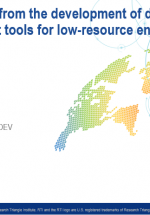Presentations
Developing eResources for Early Literacy and Numeracy [Presentation]

This presentation was delivered at the 2021 mEducation Alliance Symposium in a panel on the subject of education technologies for basic education in the Philippines.

Learning to Thrive: Education, opportunity and foundational skills in El Salvador [CIES 2021]

The El Salvador Early Grade Reading Assessment (EGRA) was conducted in 2018 in late June and early July 2018 (toward the end of the El Salvador school year, which runs from January to October). The objective was to provide the Government of El Salvador with information on the reading performance of public school students in second and third grades. The sample was designed to represent government schools at the national level with a minimum enrollment of six students in each of the second and third grades and all of the second and third grade students in these grades. EGRA is an individually administered oral assessment of foundational reading skills; in Spanish, the skills tested include letter sound identification, familiar word reading, and oral reading fluency, among others.
Closing early learning deficits in contexts like El Salvador is critical to improving economic development. According to a World Bank review of the causes of dropout in Central America, skills gaps that are not corrected through additional support and remediation compound over time. Students with weak foundational skills are more likely to struggle and become disinterested as content becomes more complex. As students age, they also face rising direct and opportunity costs and increased risk of teenage pregnancy and violence. Together these factors are associated with higher levels of grade repetition and school dropout. Analyzing El Salvador household survey data, the same report indicated that 40% of youth who had left school cited lack of interest while 25% reported economic causes as the main reasons for dropping out of school. Among girls, personal reasons, including pregnancy and caring for younger siblings, are the highest reported cause at 32%.
The EGRA results indicate that 49% of second graders and 40% of third graders are reading at or below a rate of one correct word per second. Students performing at this level for oral reading fluency are identified as “At Risk” for developing later reading difficulties, and potentially school failure. This means that additional remediation steps, such as intensive instruction and frequent progress monitoring, are needed to increase the chances that these students catch up with their peers. Early skills gaps are associated with higher levels of grade repetition and in contexts like El Salvador, where primary completion is not universal, school dropout. On nearly every component of the assessment, boys, students in rural schools, students from lower-income groups, and students with some form of self-reported disability all scored lower than their more advantaged peers. Income disparities were especially noteworthy: Students in the lowest income group were more than three times as likely to score zero on the oral reading fluency passage relative to students in the highest income group (20% versus 6%).

A Research Framework for Capturing Teachers' Decision-Making [CIES 2021 Presentation]

The purpose of this session is to articulate a research framework that centers teachers’ voices when trying to understand how teachers use curriculum materials in the classroom. Operating in the context of highly structured lesson plans, the approach identifies ways in which teachers exercise their professional discretion to modify the lesson and frames conversations to elaborate the motivations driving the teachers’ choices. The approach has been iteratively refined across three studies; taken together, the studies provide evidence for the value of listening to teachers and being responsive to their voices during implementation.
The research framework uses the lens of modifications, or changes to the intended lesson plan implemented within one class period. Modifications can be large or small, additive or subtractive. For example, in a lesson with a section for independent student practice, a large modification might be skipping the practice section entirely. Or, during a lesson focused on blending of initial sounds using 3 example words, a small modification might be extending the exercise by adding extra words. Researchers observe the lesson, noting any modifications; after the lesson, the researchers select some of the modifications and ask the teachers why they made the choices they did. Analyses of teachers’ explanations highlight the importance of understanding why teachers make the choices they do. For example, a teacher who skipped the independent practice section because they don’t think their students are ready to do the skill on their own suggests that the teacher is exercising agency and using her knowledge of her students to inform her decision-making. Insights such as this one can guide decisions on projects. It may be that while the intention of the teacher was guided by knowledge of students, the end result is not desirable from the project’s point of view. Understanding why the teacher made this choice provides implementers with better and targeted ways to address choices that impact the overall goals of the project.
In this presentation, we draw on data from an exploratory case study to understand use of new mathematics materials in Liberia, a more in-depth case conducted in Malawi on teacher use of reading materials, and finally, a systematic study examining how reading teachers use materials across four Sub-Saharan African countries. We use each case to highlight both an aspect of the research framework and instances of modifications to project implementation driven by teachers’ voices.
By focusing on teacher voices, we disrupt the deficit notion that teachers are “resistant” to change, or do not “understand” new pedagogies. Instead, we aim to value teacher voices and integrate their insight into implementation programs. By doing this, we not only raise the likelihood of successful use of new materials and pedagogies, but we also develop more responsive pedagogy that better matches existing classroom cultures.

Lessons learned from the development of digital coaching support tools for low-resource environments

CIES2021 Presentation on the use of Tangerine: Coach to provide support to teachers around the world.

Language Complexity in the Philippines [CIES Presentation]

Presentation delivered at CIES.This study attempts to determine whether or not the complexity of the L1 should be a factor in interpreting reading achievement in multilingual contexts, as well as in planning early grade reading teaching and learning materials and curricula in settings with complex languages.

Results and Implications of a 2019 Study of Fidelity of Implementation of the Mother Tongue-Based Multilingual Education (MTB-MLE) Policy in the Philippines

This presentation highlights some of the results and implications of a 2019 study on fidelity of implementation of the language of instruction policy in the Philippines. In 2009 the Philippines Department of Education issued Order No. 74 calling for the use of the learners’ mother tongue (MT) as the main medium of teaching and learning (MoTL) in kindergarten through grade 3. The policy introduces Filipino and English as additional languages of instruction, gradually increasing their usage until they take over as the primary MoTL in grade 4. Successfully navigating students through three languages in the early grades is a daunting task. Building on previous studies of MTB-MLE policy implementation in the Philippines, this study examined how teacher assignment, class sectioning (grouping learners by MT), materials provisioning and usage, and teachers’ language usage in the classroom conforms to or diverges from the policy, especially across locations with different contextual factors. It also looked at the factors associated with higher implementation.

Early Grades Reading in Uganda: Contextual Factors that Impact Reading Achievement
Early Grades Reading in Uganda: Contextual Factors that Impact Reading Achievement
Measuring Early Reading Achievement in the Philippines: How Data Can Support Policy-Making? (2019 National EGRA results)
This presentation describes results from the 2019 National EGRA study, comparing it to the same study that was done in 2013. It was presented at the International Mother Languages Conference and Festival, organized in the Philippines in 2021.

Top Management Seminar on EGR

For use during the USAID/LARA National Stakeholders Conference (July 17-19, 2018). In December 2018, LARA and SHRP together with GPE and Build Africa supported MoES BE department to plan and conduct a one day top management seminar for MoES leaders to envision the future of EGR. This learning event informed the MoES about the requirements for sustaining EGR and other initiatives meant to improve children’s learning outcomes. The focus was on the logistical, technical, and financial requirements to ensure children entering P1 after the end of the donor-funded EGR programs will continue to benefit from the investments made. MoES officials drew a roadmap with key milestones to manage the needed EGR initiatives. The objectives of the seminar were to:
• Develop an actionable and practical road map to build on and sustain gains in EGR and school quality including short term and long term priorities
• Identify specific measures needed to sustain key EGR activities through MoES and government systems
• Guide evidence-based discussion by Top Management based on data from MOES experience and EGR projects
The Evidence to action pack details how the day run and the information shared that culminated the Ministry coming up with measures for sustaining EGR in Uganda.
Reading Symposium Facilitator Guide

For use with the Uganda LARA Reading Symposium event. The National Literacy Symposium targeted a range of policy makers at the national and district levels who are key to the planning and execution of Government’s basic education programs. The main objectives of the Symposium were; i) to reflect on the challenges and successes identified by the districts during EGR implementation, ii) to discuss policy and systems level solutions to better sustain and enhance EGR throughout Uganda. The Symposium explored international best practices and research that illustrated key components for successful large scale EGR interventions and discussed how Uganda’s systems can incorporate these best practices into effective policies and systems. The symposium was guided by two key documents namely; facilitators’ guide and information pack. A) The facilitators’ guide guided the smooth running of the sessions and it is a good document that can be adapted when planning for big learning events. B) The information pack included data on reading assessments, teacher uptake of the early grade reading methodology, instructional support, approaches to teacher growth and development at school, college and district level and improved performance management, accountability and financing efficiency. Generally the information pack helped participants to reflect on the following questions:
• Are children learning to read?
• Do we have quality reading instruction?
• Are teachers supported to teach reading?
• Are primary schools positive and supportive for teaching and learning?
• Are there clearly communicated performance expectations and monitoring and accountability systems in place?
• What are the resources required and the necessary decisions for the future of early grade reading?
